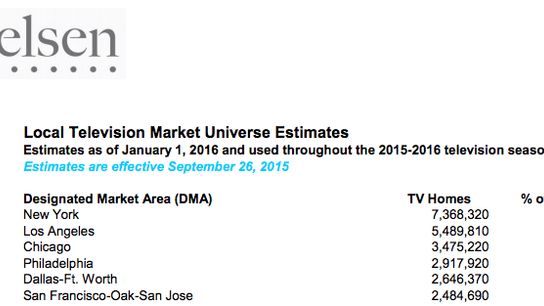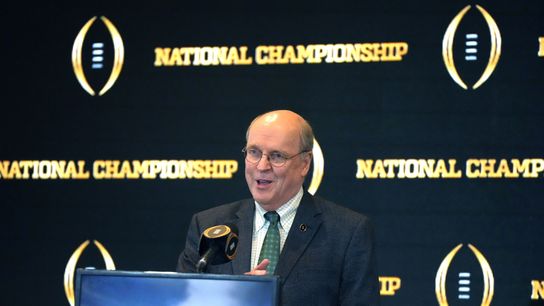Much has been made of the massive ratings dip caused by the Powers That Be's insistence to play the College Football Playoff semifinals on New Year's Eve -- and deservedly so. It's the Crystal Pepsi of sports ideas, resulting in a ratings drop comparable only to the NBA Finals going from Michael Jordan's final appearance (1998) to a lockout-shortened season (1999). That's the kind of ground the College Football Playoff's leaders tread on. But that subject's been covered to death in the last week and a half.
Another, quieter disservice college sports leaders have done to the game that no one mentions: playing its biggest games on cable.
Sports Business Journal media writer John Ourand penned a lengthy piece about the trend of major sports properties moving back to broadcast television (ABC, NBC, CBS, FOX) from cable after a decade of doing the opposite:
- The British Open, which moves from ESPN to NBC.
- The NBA, which created a new Saturday night package on ABC.
- Even ESPN's own ESPYs is expect to remain on ABC after a 250 percent ratings spike in 2015.
Consider the NFL. A league so greedy that, if it were a person, would rifle through its own mother's open casket in search of loose change, exclusively shops its Thursday Night Football package to broadcast networks even though it receives most of its billions from ESPN and DirecTV and requires both Thursday and Monday games simulcast on broadcast networks in the local markets of the teams involved.
A league that stops at nothing in search of its goal of reaching $25 billion in revenue by 2027 (see: Rams, St. Louis) has the foresight to pass on cable's easy money because it recognizes getting its product under as many eyeballs as possible is what best serves the league's long-term interest.
“I’ve been hearing that network television has been dead since the day I took this job over 20 years ago,” CBS president and CEO Les Moonves said. “Network is still pretty damn important and pretty damn successful.”
And this is where we bring in college sports.
Search "College Football Playoff" in Ourand's piece. You won't find it. Won't find "Final Four" either. The power conference commissioners that run college football started the trend when the BCS's television rights were sold to ESPN in 2008, and college football then doubled down by selling the College Football Playoff to ESPN through 2025. The NCAA followed suit in 2010 when it married Turner Sports to CBS for the NCAA Tournament, which will see Final Four games bounce between CBS and TBS through the middle of the next decade.
For the obvious wise-guy "Who cares?" retort, here's a figure: 25 million people. Cable is in 99.6 million homes and falling -- dropping to eight figures for the first time since 2007 -- while ESPN itself is in 91.4 million. Broadcast TV is in 116.4 million homes and rising.
Though they couldn't have known it at the time (and never forget, these are the same guys that clung to the bowl system long after that life raft had deflated, they aren't visionaries) the Power 5 commissioners shut the CFP out of 25 million homes -- and growing -- by selling it to ESPN instead of ABC.
That's more than the market sizes of New York, Los Angeles, Chicago, Philadelphia, Dallas-Fort Worth and the Bay Area combined.

Try to think of a major sporting event that doesn't conclude on one of the four big networks. The Super Bowl bounces between CBS, NBC and FOX. The World Series is on FOX, as is the Daytona 500. The NBA Finals are on ABC. Golf has the Masters and the PGA Championship on CBS, the U.S. Open on FOX and, now, the British Open on NBC.
As for cable? The CFP and Final Four's only company are the tennis majors and some Stanley Cup Finals games. Well, that and all the money they made.
